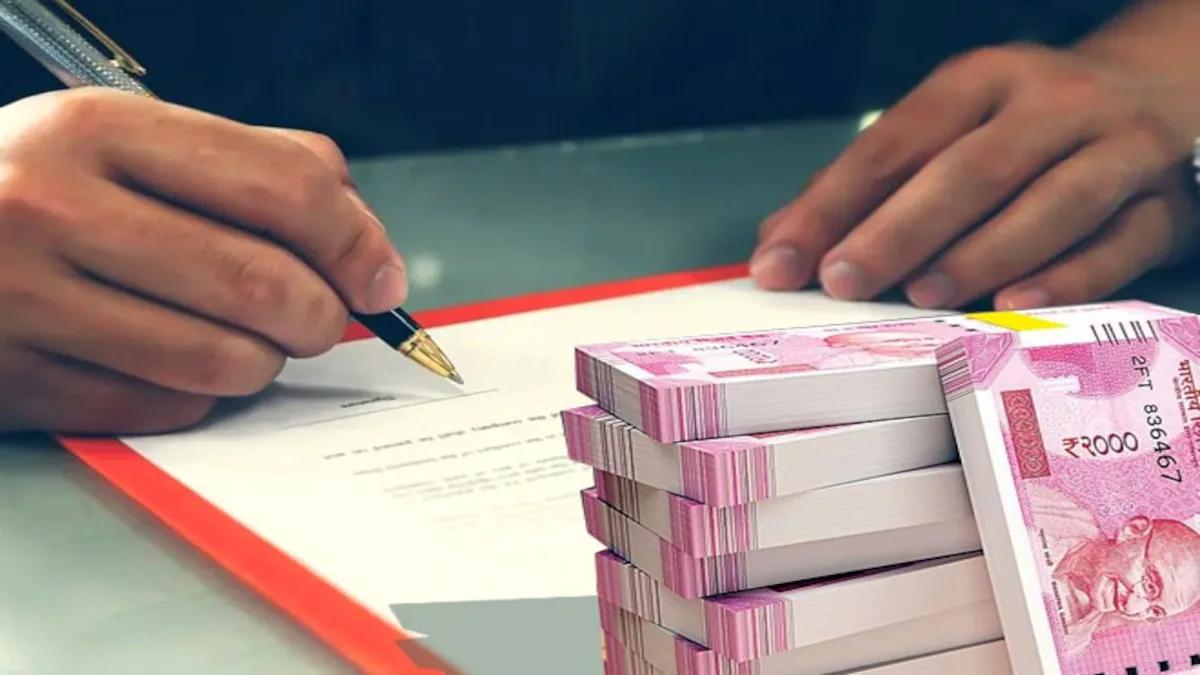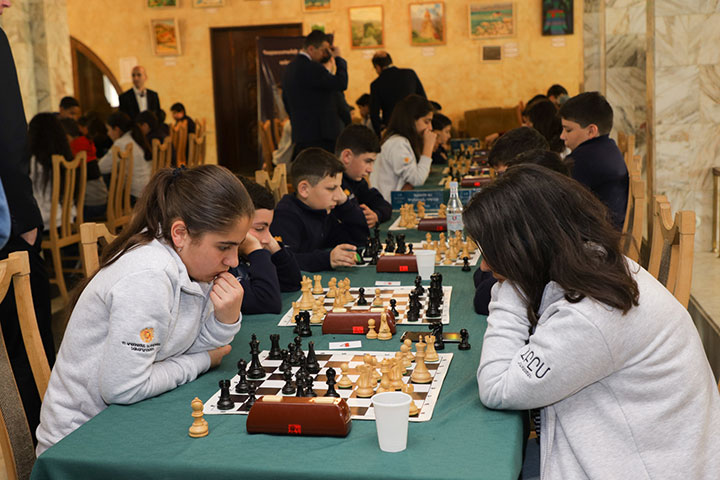
In the homeland of school chess
All Armenian children learn chess at school. From grade two to four they have two weekly chess lessons. Introducing chess for everyone in 2011 was a coup. International news media started to celebrate Armenia as the smartest nation on earth. The introduction of chess as a subject was helped by the President of Armenia Sersh Sargsyan being also President of the Armenian Chess Federation. But a year ago huge protests in the streets of Yerevan drove Sargsyan out of office.
The new government still seems to support chess and recently allocated the equivalent of €200,000 to Levon Aronian’s renewed effort to become world champion. Yet, the game is not sacrosanct and has to prove its value in schools. Parents have been questioning the programme.
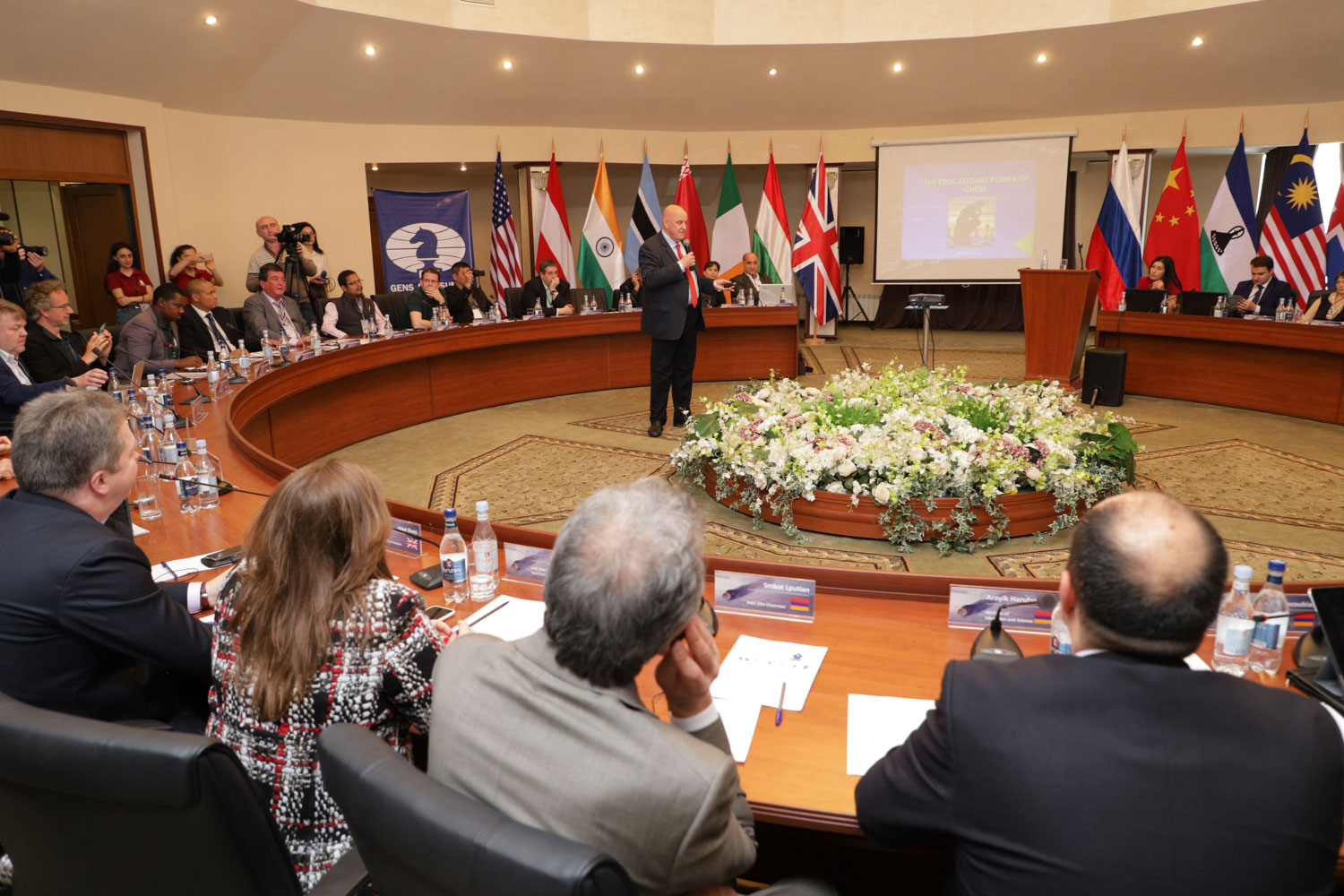
Unlike in other primary school subjects most parents are clueless when it comes to helping with their children’s chess homework. Have a look at this position from the grade four textbook:
Armenia has a prestigious tournament for nine-year olds. It is the Primary Schools Chess Championship. This season´s finals were staged in parallel with an international conference in Tsakhkadzor, a resort town fifty kilometres north of Yerevan which regularly hosts chess events, for instance the team world championships in 2015. Chess luminaries who came for the conference went to see what Armenian nine-year-olds produced in their school tournament and came away impressed.
“Normally you see something odd on some boards, but here they all had normal positions”, said Judit Polgar.
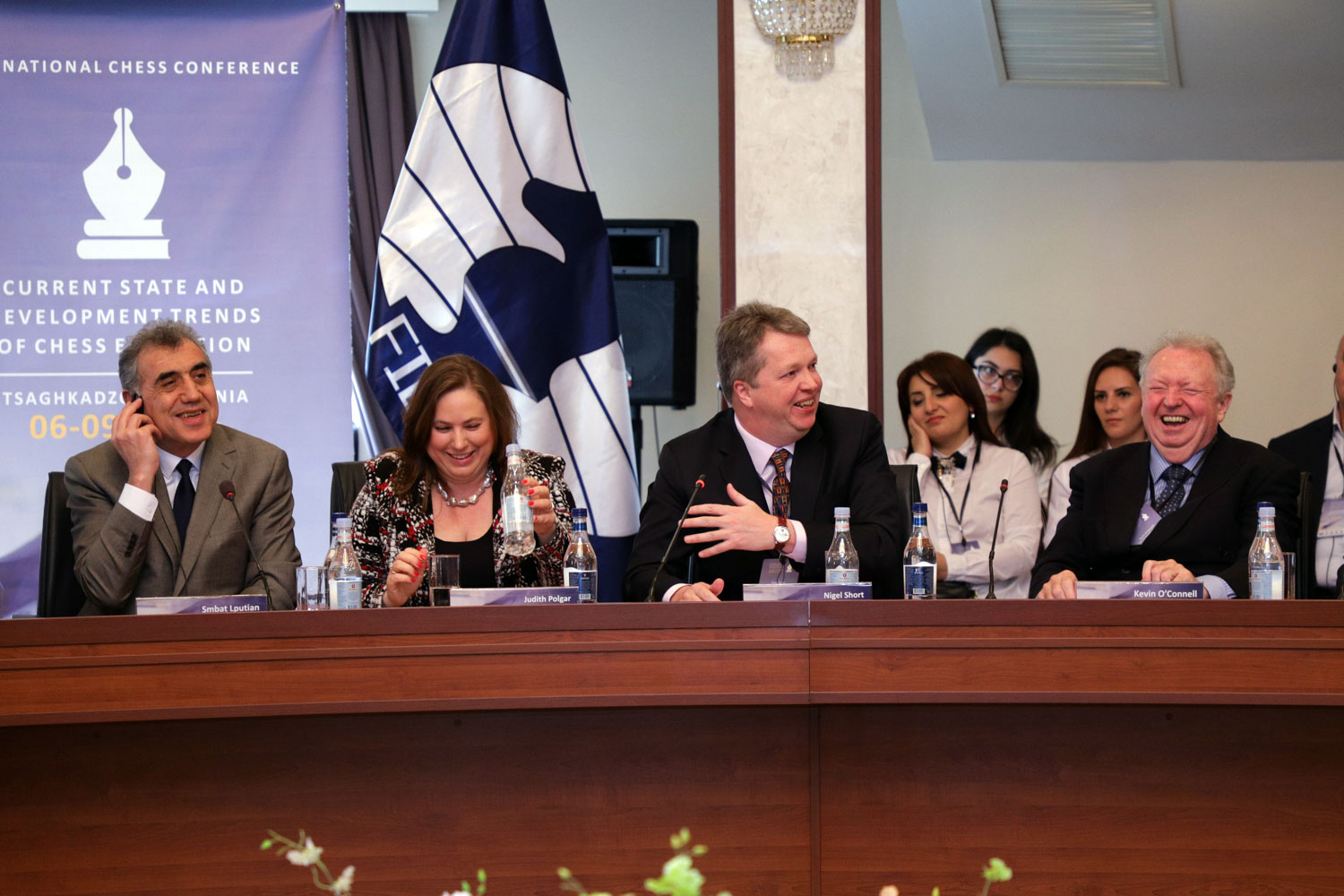
Grandmasters Smbat Lputian (an Armenian scholastic chess pioneer), Judit Polgar, Nigel Short were among those in attendance | Photo: Armenian Chess Academy
Smbat Lputian, who initiated the Armenian Chess Academy 17 years ago out of which the school chess programme developed that he is heading today, shared how he once visited a school chess lesson and casually tried to solve the same problems as the pupils. He was puzzled when they solved it faster than him, the Grandmaster.
Before you imagine the mass production of Aronians by the Armenian school system, be told that the chess content is currently under revision with the explicit goal to make it easier and more accessible. After all, the objectives are educational rather than competitive. The programme is ambitious but far from self-congratulatory. At the conference, titled “Current State and Development Trends of Chess Education”, the Armenian presenters talked time again about difficulties. In the early years, many chess lessons were held by chess players. But few of them were able to pick up the pedagogical skills. Regular teachers that were motivated to study chess turned out to be superior at teaching chess.
Since many children struggled with the competitive nature of chess emotional intelligence became an issue. Several presenters addressed if and how chess lessons promote creativity. In 2018, the Chess Scientific Research Institute was installed at the Armenian State Pedagogical University in Yerevan. It comprises 18 scientists from education, didactics, psychology, sociology and philosophy. Most of them spoke at the conference (all presentations are available in English here). The Institute’s director, Vahan Sargsyan, is also initiating a new scientific journal that will be open for scholarly publications about educational and social aspects of chess.
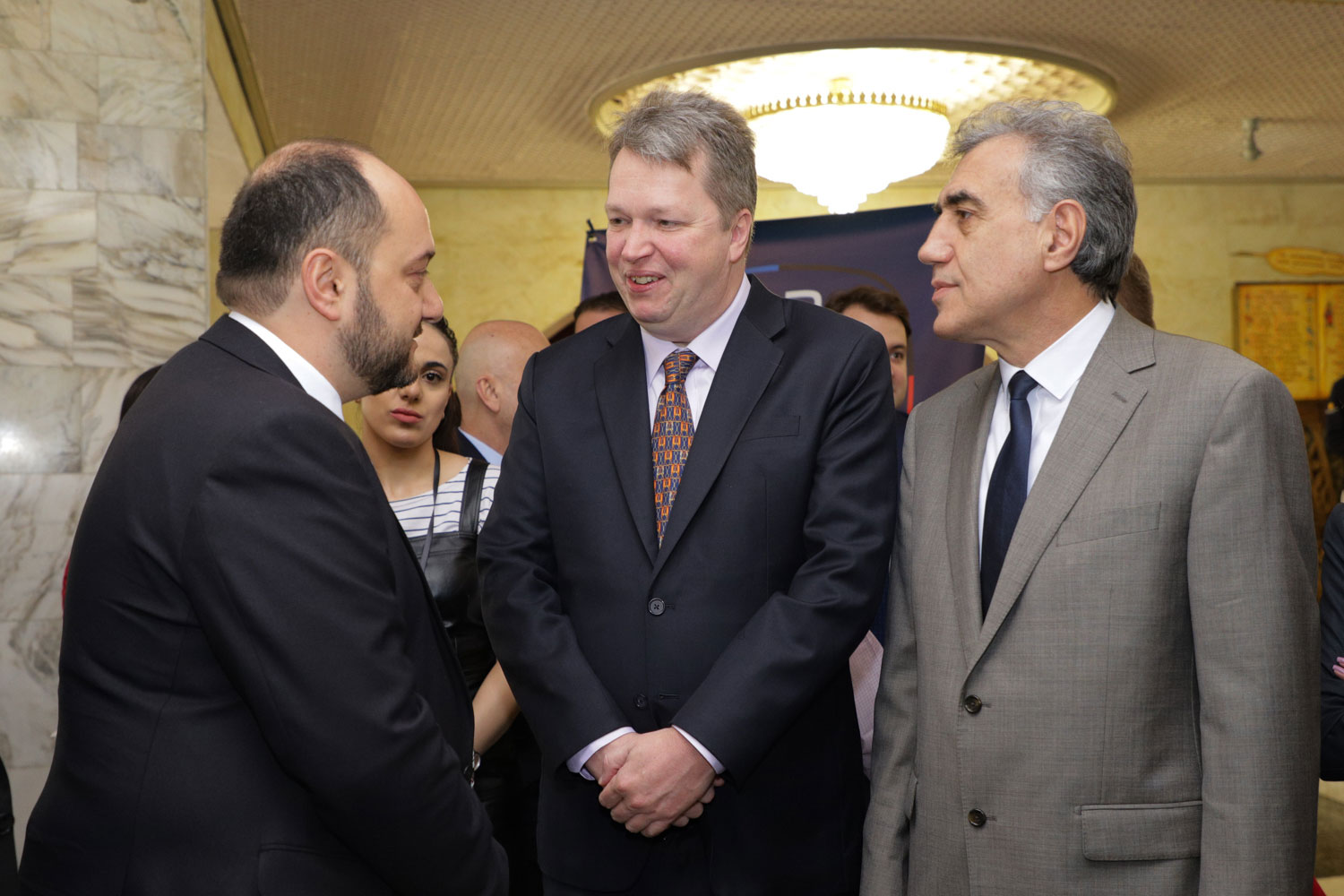
Armenia’s Minister of Education Arayik Harutyunyan, FIDE Vice President Nigel Short and Smbat Lputian | Photo: Armenian Chess Academy
The first speaker was Armenia’s Minister of Education Arayik Harutyunyan. Foreign speakers addressed practical angles such as how to convince teachers and politicians about the benefits of chess, how it can fit into subjects from mathematics to history or how it can be applied for children with special educational needs. Belarus, Iceland and Kazakhstan sent representatives to learn for the national role-out of their national school chess programmes.
Evgeny Vladimirov and Alexander Onischuk run chess programmes at the university level in Alma-Aty respectively Texas. Both Grandmasters have joined the Education Commission of FIDE which is now also dealing with chess in higher education. The commission is led by Smbat Lputian. The Armenian has come in with a strong commitment to help school chess programmes worldwide in raising their standards. The only link to the old Chess in Schools Commission is the former chairman Kevin O’Connell remaining on board as the secretary.
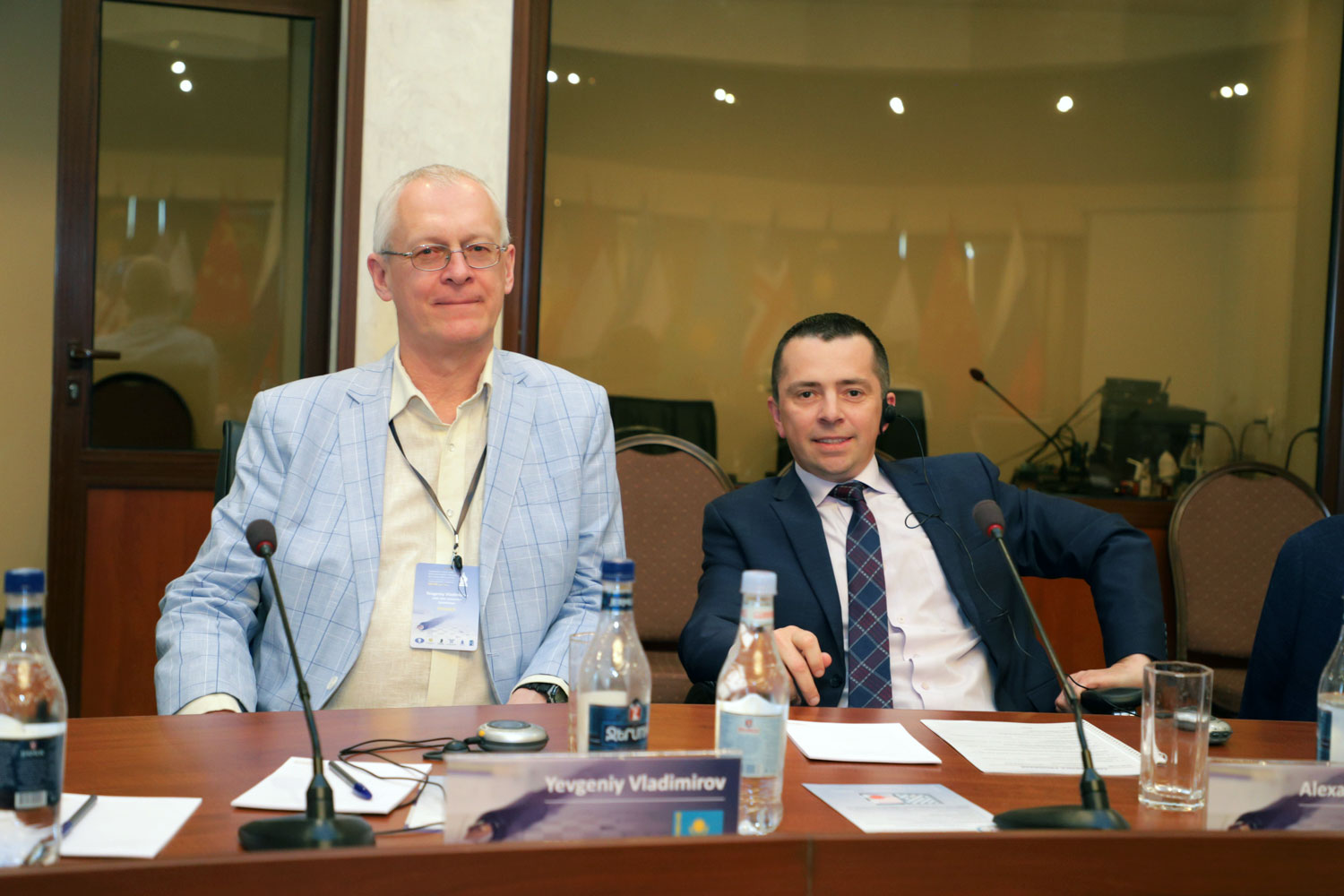
More Grandmasters on the FIDE Education Commission: Evgeny Vladimirov (Kazakhstan) and Alexander Onischuk (USA) | Photo: Armenian Chess Academy
Two celebrities were among the approximately seventy attendees. Judit Polgar, who has joined FIDE as Honorary Deputy President with a double focus on school chess and on gender issues, is very knowledgable and made many constructive comments. She was instrumental in Hungary adopting chess as a voluntary school subject and has been running her own programme since 2012. Nigel Short came to Armenia to learn, as he stressed repeatedly. In his new function of FIDE Vice President the Englishman recently toured the Caribbean and met with not less than five Ministers of Education there. Short felt that he needs to know much more about chess in education.
At the final round table, before a very fruitful and excellently organized conference ended with a gala dinner, Alexander Onischuk reminisced a curious coincidence: When the Chess Olympiad 1996 took place in Yerevan, four present Grandmasters played each other in the very last round in the fight for team medals. Short beat Polgar, but England came half a Buchholz point short of Bronze. Onischuk’s draw against Lputian secured silver for the Ukrainian team, while Armenia had to settle for fifth place.
[“source=chessbase”]


